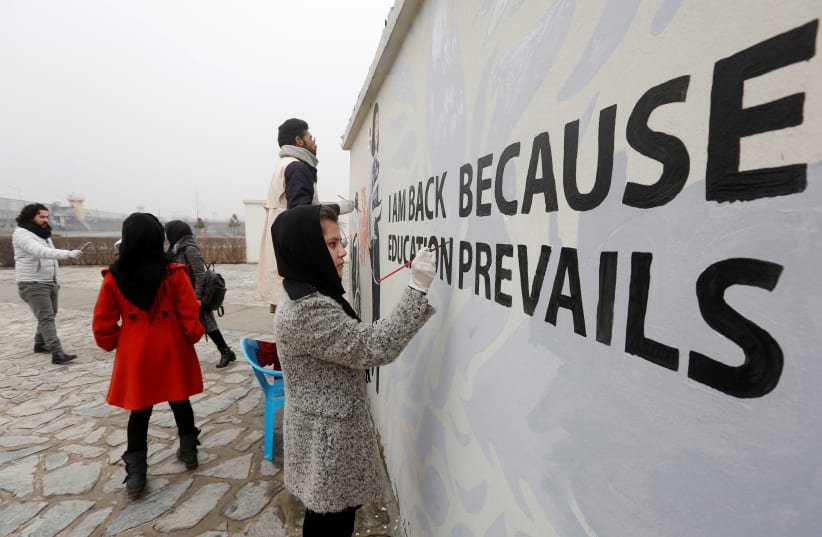Atiqullah Amarkhail, a retired general and security analyst told the Washington Post: “Ordinary people get stuck on the roads when officials drive past. Some in need of being rushed to hospital have perished,” adding that, "The walls [also] attract the attention of attackers. If something happens, they will be protected inside, and we outside will be the victims.”Many in the city see no other option but to wait for security officials to remove the walls following a foreign peace agreement - however, the ArtLords initiative decided to take a more direct and proactive approach to the issue.“I grew up in Kabul. This is my city,” said Omaid Sharifi, co-founder of the ArtLords grassroots movement, according to the Post. “I’ve been here during Taliban, mujahideen, all the wars and everything. The city I remember wasn’t like this. This looks like a prison to me. You cannot go get a shovel and bring them down. So we decided to use paint.”The ArtLords, established in 2014, began decorating the miles of grey walls with the permission of state officials, in order to lighten up their environment and send messages to those holding power that Afghani citizens will not sanction corruption within the government, the disregard for women's rights or the deterioration of public health to consume the country."I remember the times when you could walk everywhere in the city, I could ride my bicycle to any place I wanted to. There were no roadblocks, there were no ugly blast walls that you see," Sharifi, told Al Jazeera. "And then suddenly everything changed because of security issues. They started taking our space, the space that belongs to us, the citizens of Kabul. This space is taken by the foreigners, by government officials, all these people. They just started putting those ugly blast walls which made Kabul look like a prison."The ArtLords initiative, originally spearheaded by Sharifi and a group of friends, now consists of a collective of 53 staff members and volunteers spanning all across Afghanistan - with fifty to one-hundred people normally contributing to each mural, many including enthusiastic passerbys.“روزی که قدرت دوست داشتن بر دوست داشتن قدرت پیروز شد، آنگاه ما شاهد صلح واقعی خواهیم بود.”به مناسبت ۱۵۰ سالگرد تولد #گاندی (۲اکتوبر) این تصویر در دیوار های کابل یکجا با شهروندان نقاشی شد. pic.twitter.com/EPazV6IN2O
— ArtLords-هنرسالار (@ArtLordsWorld) September 7, 2019
“I feel like we are under siege,” ArtLords artist Kabir Mokamel said in 2015, according to the Los Angeles Times. “Everywhere we go, we are surrounded by barriers.”That year the group commissioned a mural displaying a watchful pair of eyes on the National Directorate of Security's (NDS) blast wall looking over the streets of Kabul."I'm watching you. Corruption is not hidden from God or the people's eyes," the message on the mural reads.Kabul residents remark their paintings as being both beautiful and educational, while volunteers recalled painting the mural as "therapeutic," adding that they commission materials for the paintings out of their "own pockets or through volunteers who either picked up a brush or gave [them] whatever amount they could spare" - playing an important role in changing the negative appearance of the city surrounded by barriers into positive artworks spreading thought-provoking messages."When I first saw their anti-corruption mural which says 'I see you' it really struck me, and at that point I decided that I want to work with them. They criticize the government and they have created a platform to voice people's demands," said volunteer artist Meher Ava, 25, according to Al Jazeera.However, not all feedback to the imitative is positive. An NDS official took offense to the initial creation of the mural commissioned on the organization's blast wall and ordered to have it whitewashed - the ArtLords eventually persuaded the NDS to let them repaint the mural."People treat you like a celebrity, but also as an infidel that should be killed," Sharifi told Al Jazeera.The group has been receiving threats since the idea's inception - mainly receiving push-back from conservatives who disagree with the group's general view of the world as well as the portrayal of their commissioned art projects against the central government.اینجا ترینکوت ولایت ارزگان است. هر ساحه نقاشی ما، به محل گفتمان برای ترویج تفکر انتقادی، تفریح وقصه خوانی تبدیل میشود. نقاشی برای محو پولیو در ۱۲ ولایت افغانستان pic.twitter.com/YCFqfbAur0
— ArtLords-هنرسالار (@ArtLordsWorld) August 29, 2019
“For the business people, these former warlords or even drug lords, it has become a matter of prestige,” Sharifi said, according to the Post. “I really wanted to have a message for them, that this thing you are doing to show your power actually shows that you’re corrupt.”"I have accepted the Taliban as a reality in this country. I think it is time for them to accept me. As a person who loves painting, music and dancing, as a person who has a gallery. It's a diverse country and we have to find the time to talk, tolerate and speak to each other," Sharifi told Al Jazeera."What we want to do is spread some love, kindness, smiles. I think that people here need healing. I need healing. What we are doing right now is try to heal our country, our people, one person at a time."#NewYearsEve2017 #HappyNewYear from all of us at #ArtLords of #Afghanistan - sharing love and praying for peace and harmony. pic.twitter.com/sYFdU2xC4k
— ArtLords-هنرسالار (@ArtLordsWorld) January 1, 2018
عنایت فکرت و نجیب الله ۲۵ ساله بودند که موتر حامل شان با یک ماین کنار جاده در ولسوالی بالامرغاب ولایت هرات تصادم کرد و شهید شدند. مانند نجیب الله وعنایت، حدود ۳۵ هزار انسان بی گناه مظلومانه در ۱۸ سال اخیر شهید شدند. #درد_افغانستان_دردمشترک_است pic.twitter.com/FB9085Aj1V
— ArtLords-هنرسالار (@ArtLordsWorld) August 25, 2019
